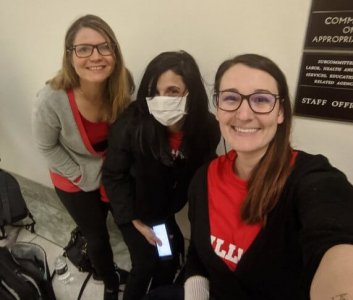ME/CFS Protesters Interrupt House Appropriations Hearing
FOR IMMEDIATE RELEASE:
Contact: Adriane Tillman
press@meaction.net
Today, #MEAction protesters wearing red #millionsmissing t-shirts interrupted NIH Director Dr. Francis Collins’s opening statement to the House Appropriations LHHS Subcommittee hearing to demand the NIH take urgent, comprehensive action to stem the crisis of ME/CFS that has been growing unchecked for more than three decades.
Watch the video (https://youtu.be/J5Oy2oZozEo) of activist Whitney Fox stand up and address Dr. Collins, catching him off-guard. “Dr Collins: Stop ignoring the ME/CFS crisis! Over one million are sick, disabled, or bedbound.”
As Capitol Police approach, Matina Nicholson jumps in. “We are gravely ill! Dr. Collins, we are gravely ill! Stop neglecting ME/CFS now!”
Both protesters complied with Capitol Police, putting away their signs and walking out while still speaking their message. Whitney calls out, “I am speaking out on behalf of over a million sick Americans. Too sick to work. Too sick to have families. Too sick to leave our beds.”
“We need major funding NOW for ME/CFS, not in 30 more years,” said protester Whitney Fox, 31, of Crofton, Maryland, who developed ME/CFS after getting the swine flu. “I wasn’t yet born when the ME/CFS outbreaks came to the attention of the NIH in 1984, yet they’ve done almost nothing in those three decades to investigate this cruel disease affecting over 1 million Americans.”
Dr. Francis Collins responds to the protesters’ demands. “I do want you to know that the condition ME/CFS, Chronic Fatigue Syndrome, is of great concern to the NIH,” he said, adding that he, “Would like very much to talk about it at a later point.”
#MillionsMissing is a global movement representing more than 1 million Americans – and estimated 15-30 million people worldwide – missing from their lives due to the severe neuroimmune disease, myalgic encephalomyelitis, also known as chronic fatigue syndrome or ME/CFS.
Since the outbreaks in the early ’80s, the NIH has made zero progress towards finding a biomarker, treatments, clinical trials or even reaching consensus on disease criteria. As a result, many people with ME/CFS have languished bedridden for decades, undiagnosed and untreated, with little hope of returning to the careers and communities from which they have gone missing.
The ME/CFS community is calling on the NIH to follow the recommendations of Congress to “expand ME/CFS efforts,” including provide set-aside funding for ME/CFS, reach consensus on the ME/CFS case definition and incentivize researchers to enter the field. (See the 2020 Budget pg. 78.)
The protesters who interrupted today’s subcommittee hearing are part of a growing movement of people with ME/CFS who are putting their debilitated bodies on the line to demand justice.
In May, demonstrators will take to the streets around the world demanding their governments address the health crisis of ME/CFS as part of the #MillionsMissing movement. Last year, more than 100 cities took part in this global protest. In the U.S., protesters will descend on Washington, D.C., demanding the NIH take these five actions to end the crisis.
ME/CFS is more prevalent than multiple sclerosis and HIV/AIDS, and more debilitating than MS, heart disease and stroke and, yet, the NIH has allocated barely any resources to investigating it. In 2020, the NIH will spend a mere $13 per person annually on ME/CFS research compared to $253 for MS and $73 for Lupus. For more than two decades, the NIH funded ME/CFS at about $5 million per year – about the same amount as hair loss!
The ME/CFS community will not let another generation lose decades of their lives to the same crisis. They are demanding justice – urgent, comprehensive action – for ME/CFS from their health agencies, and will do whatever it takes, even sacrificing their health, to fight for a better future.
#MEAction is an international non-profit comprised of people with ME, caregivers, family members and allies fighting for recognition, treatments, education and equity for ME/CFS.





